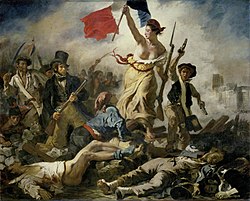Social revolution
| Part of a series on |
| Revolution |
|---|
 |
|
|
Social revolutions are sudden changes in the structure and nature of society.[1] These revolutions are usually recognized as having transformed society, economy, culture, philosophy, and technology along with but more than just the political systems.[2]
Overview[]
Theda Skocpol in her article "France, Russia, China: A Structural Analysis of Social Revolutions" states that social revolution is a "combination of thoroughgoing structural transformation and massive class upheavals".[3] She comes to this definition by combining Samuel P. Huntington's definition that it "is a rapid, fundamental, and violent domestic change in the dominant values and myths of society, in its political institutions, social structure, leadership, and government activities and policies"[4] and Vladimir Lenin's, which is that revolutions are "the festivals of the oppressed...[who act] as creators of a new social order".[5] She also states that this definition excludes many revolutions, because they fail to meet either or both of the two parts of this definition.[6]
Academics have identified certain factors that have mitigated the rise of revolutions. Many historians have held that the rise and spread of Methodism in Great Britain prevented the development of a revolution there.[7] In addition to preaching the Christian Gospel, John Wesley and his Methodist followers visited those imprisoned, as well as the poor and aged, building hospitals and dispensaries which provided free healthcare for the masses.[8] The sociologist William H. Swatos stated that "Methodist enthusiasm transformed men, summoning them to assert rational control over their own lives, while providing in its system of mutual discipline the psychological security necessary for autonomous conscience and liberal ideals to become internalized, an integrated part of the 'new men' ... regenerated by Wesleyan preaching."[9] The practice of temperance among Methodists, as well as their rejection of gambling, allowed them to eliminate secondary poverty and accumulate capital.[9] Individuals who attended Methodist chapels and Sunday schools "took into industrial and political life the qualities and talents they had developed within Methodism and used them on behalf of the working classes in non-revolutionary ways."[10] The spread of the Methodist Church in Great Britain, author and professor Michael Hill states, "filled both a social and an ideological vacuum" in English society, thus "opening up the channels of social and ideological mobility ... which worked against the polarization of English society into rigid social classes."[9] The historian Bernard Semmel argues that "Methodism was an antirevolutionary movement that succeeded (to the extent that it did) because it was a revolution of a radically different kind" that was capable of effecting social change on a large scale.[9]
Marxist-Leninists[who?] argue in favor of and work for both political and, more importantly[according to whom?], social revolution, as to change the social relations and the economic base of society fundamentally beyond the capitalist stage.[clarification needed][citation needed]
See also[]
- East Sumatra revolution, also known as the East Sumatra Social Revolution
- Quiet Revolution
- Rojava Revolution
- Rwandan Revolution, also called the "Social Revolution”
- Social Revolution festival
- Sociology of Revolution
References[]
- ^ "social revolution". oxforddictionaries.com. Oxford University Press. Retrieved 24 August 2017.
- ^ Irving E. Fang, A History of Mass Communication: Six Information Revolutions, Focal Press, 1997, ISBN 0-240-80254-3, p. xv
- ^ Skocpol, Theda. 1979. States and Social Revolutions: A Comparative Analysis of France, Russia and China. Cambridge: Cambridge University Press., p. 173
- ^ Huntington, Samuel P. 1968. Political Order in Changing Societies. New Haven: Yale University Press., p.264
- ^ (Skopcol, op cit)
- ^ Skocpol, Theda. 1979. States and Social Revolutions: A Comparative Analysis of France, Russia and China. Cambridge: Cambridge University Press., p.3.
- ^ Hobsbawm, Eric (1957). "Methodism and the Threat of Revolution in Britain". History Today. 7 (5).
Historians have held that religious Revivalism in the late eighteenth century distracted the minds of the English from thoughts of Revolution.
- ^ Maddox, Randy L.; Vickers, Jason E. (2010). The Cambridge Companion to John Wesley. Cambridge University Press. p. 179. ISBN 9780521886536.
- ^ a b c d Swatos, William H. (1998). Encyclopedia of Religion and Society. Rowman Altamira. p. 385. ISBN 9780761989561.
- ^ Thomis, Malcom I.; Holt, Peter (1 December 1977). Threats of Revolution in Britain 1789–1848. Macmillan International Higher Education. p. 132. ISBN 9781349158171.
Further reading[]
- J.7 What do anarchists mean by social revolution? from An Anarchist FAQ, Volume 2 (2012) [1]
- Anarchist theory
- Libertarian socialism
- Revolution terminology
- Revolutions by type
- Social anarchism
- Trotskyism
- Sociology stubs
